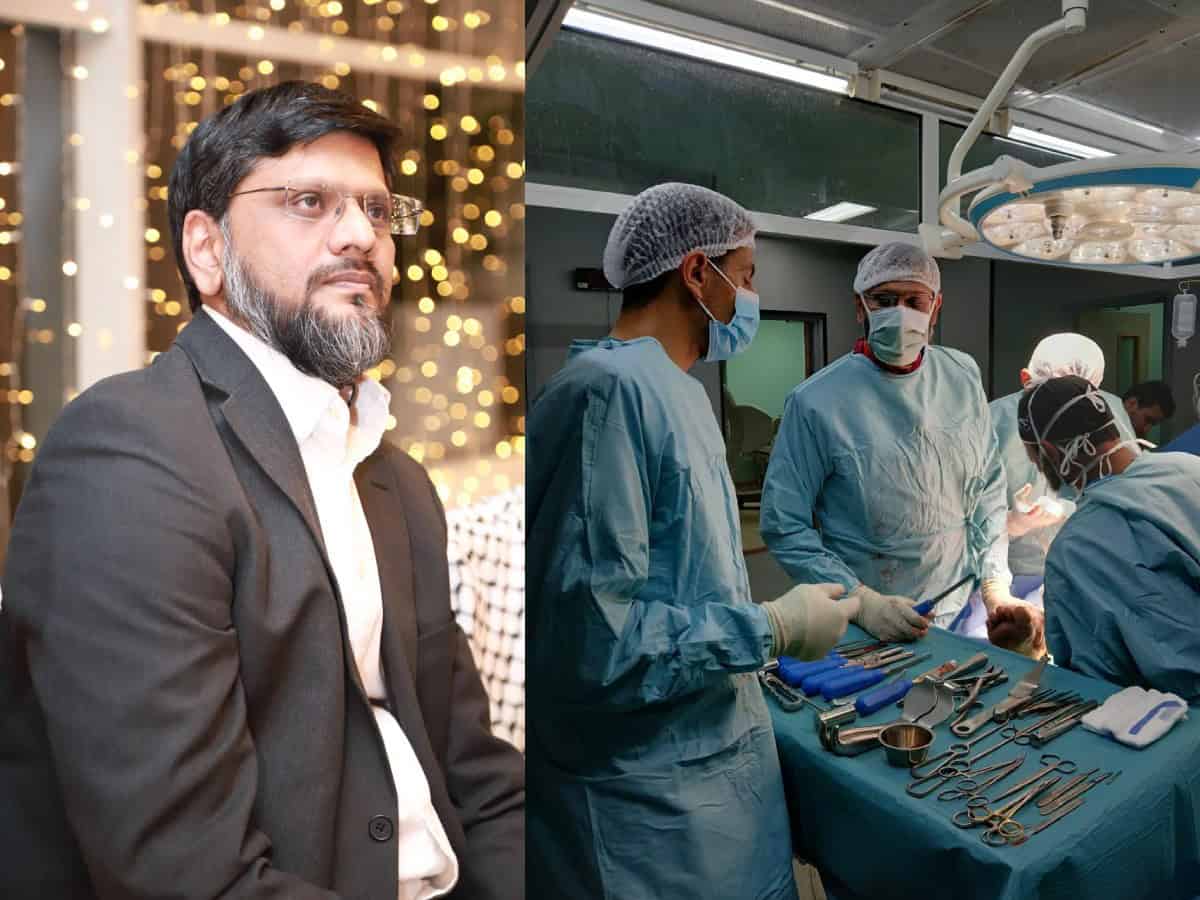
Hyderabad: The sky over Gaza was a dull shade of grey, clouded with the dust and smoke of relentless airstrikes. The constant hum of drones overhead had become an eerie backdrop to the cries of the wounded. Buildings lay in ruins, entire neighborhoods turned into graveyards of rubble and memories. It was into this inferno that Dr. Yousufuddin Shaikh, a Hyderabad-born trauma surgeon, walked without hesitation, his only weapon being his scalpel and an unshakable resolve to save lives.
The Israel’s war in Gaza had reached an unthinkable level of devastation. The air was thick with the acrid scent of burning debris, mixed with the unmistakable metallic tang of blood. As fighter jets roared overhead, the civilians on the ground scrambled for cover, clutching onto whatever little they had left. But for Dr. Shaikh, this was no time to cower. This was the moment his Hippocratic Oath mattered the most.
A seasoned humanitarian
A seasoned humanitarian, Dr. Shaikh had been part of several missions in war-torn regions before–Lebanon, Turkey, and even the aftermath of the Godhra riots in India. A product of the Deccan College of Medical Sciences, Hyderabad, he is a consultant orthopaedic surgeon, Birmingham, UK. His specialization in trauma and foot-and-ankle surgery, refined in Birmingham, had prepared him for the technical aspect of the job. But nothing could prepare him for the scale of suffering he witnessed in Gaza.
Along with his colleagues from the Doctors of Rahman, a humanitarian wing of the Midland International Aid Trust, Dr. Shaikh was selected by the UN Emergency Medical Team in February 2024. His journey was arduous. From Lebanon to Cairo by air, followed by a tedious road trip through the Egyptian desert of Arish via the Rafah border crossing. His team had to navigate a labyrinth of bureaucracy, crossing at least 40 police checkpoints before they were finally allowed into Gaza.
He was stationed at the European Gaza Hospital, one of the few medical centers still operating amid the destruction. The conditions were harrowing. Supplies were dangerously low – there were barely any antibiotics, surgical tools, or anesthesia. Patients lay in overcrowded corridors, many screaming in pain, some too weak to even moan. The hospital’s emergency rooms were flooded with civilians – children with amputated limbs, mothers cradling their lifeless infants, men whose bodies bore the grotesque marks of shrapnel wounds.
Working round the clock

Dr. Shaikh worked around the clock, performing between six to ten operations daily. Sleep became a distant luxury; food, an afterthought. In three weeks, he lost 14 kilograms, not just due to exhaustion but also because of the overwhelming stress of watching innocent lives slip away. There were times when, mid-surgery, an explosion would shake the ground beneath them. But there was no time to flinch. The wounded needed him, and every second counted.
One evening, amidst the horror, a moment of profound humanity shone through. It was the holy month of Ramzan, and Dr. Shaikh’s team decided to organize an Iftar. They pooled together their limited resources and asked a Palestinian hospital staffer to buy some food for the following day. The man refused to take the money. He simply smiled and said, “I am not sure I will be alive tomorrow.” Such was the cruel uncertainty of life in Gaza.
The Israeli military’s bombardment spared no one. Schools, refugee shelters, even hospitals like Al-Shifa were targeted. There was no ‘safe zone.’ And yet, amid the relentless destruction, Dr. Shaikh found inspiration in the resilience of the Palestinian people. He was moved by their unwavering faith. Even as they lay broken and bleeding, many clung to their Quran, whispering prayers with cracked lips. Their strength in the face of unimaginable adversity left an indelible mark on his heart.

On Eid day, Dr. Shaikh and his team finally left Gaza, returning to London as if they had journeyed to hell and back. But their mission didn’t end there. Seeing the plight of Palestinian medical students whose education had been shattered by war, Doctors of Rahman launched an initiative to relocate these students to safer countries. Today, over 350 Palestinian medical and dental students have found refuge in South Africa, Malaysia, and other parts of Asia, continuing their studies with the hope of one day returning to rebuild their homeland.
Dr. Shaikh’s commitment to humanitarian service stems from his upbringing. His father, Sharfuddin Shaikh, retired Assistant Commissioner of Police (ACP) and mother, Khursheed Begum, instilled in him the values of empathy and duty. It was his mother, in fact, who encouraged him to take up the Gaza mission, urging him to go where he was needed the most. His wife and children, too, supported his calling, knowing that the burden of saving lives outweighed their personal fears.
The other day, Dr. Shaikh was felicitated by Western Hospitals and the Media Plus Foundation for his outstanding service in Gaza. During the event, he shared his experiences and highlighted the urgent need for medical services and educational support for Palestinian students. He emphasized that while medical aid is crucial in war-torn regions, empowering future generations through education is just as vital. His words resonated deeply, reinforcing the mission of Doctors of Rahman to facilitate overseas clinical training for those affected by conflict.
Pain knows no language
Reflecting on his time in Gaza, Dr. Shaikh recalls how language barriers dissolved in the face of human suffering. “I know only a little Arabic, but you don’t need words when you understand the language of pain and anguish,” he says.
Even in the bleakest of places, where hope seemed like a distant dream, Dr. Yousufuddin Shaikh proved that humanity endures. His hands, though stained with blood, were the hands of healing. His presence, a beacon of light in the darkness of war. And his story, a testament to the unyielding spirit of those who choose compassion over fear, duty over comfort, and life over despair.

